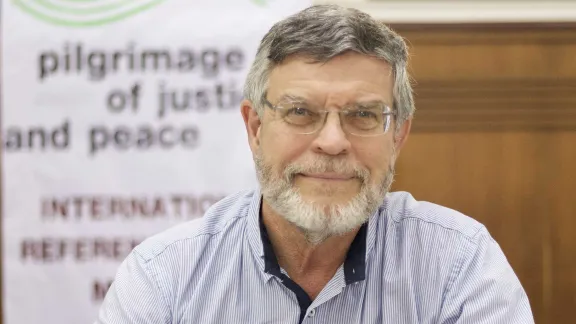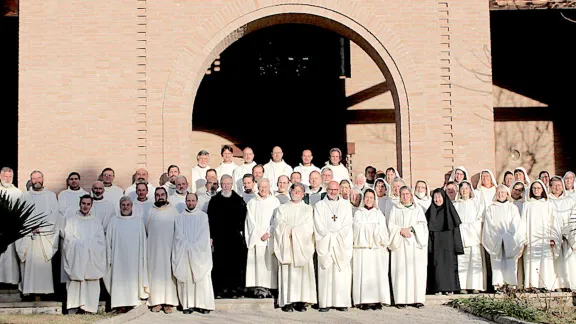
Brother Guido and the other members of the Drafting Committee which prepared the materials for the 2025 Week of Prayer for Christian Unity. Photo: Bose Monastery
Members of Italy’s Bose monastic community draw on 2025 Nicaea anniversary to prepare resources for Week of Prayer for Christian Unity
(LWI) - “Do you believe this?” The question that Jesus posed to Martha in Bethany, following the death of her brother Lazarus, is a question posed to all Christians down the centuries since then. It is also the question at the heart of this year’s Week of Prayer for Christian Unity, coinciding with the 1,700th anniversary year of the Council of Nicaea that drew up the first creed, or common statement of shared Christian beliefs.
Celebrations for this important anniversary will take place in many churches and communities throughout 2025, with events focusing on both the historical context in which the Council took place and its relevance for believers in contemporary societies. Convoked by the Roman emperor Constantine, the gathering in Nicaea, in modern-day Turkey, brought together church leaders to discuss theological questions, most importantly the divine nature of God the Son which was dividing the Christian world at the time, as well as practical questions concerning the liturgy and the role of bishops.
In material prepared for the 18 to 25 January Week of Prayer for Christian Unity, members of the ecumenical monastic community of Bose in northern Italy reflect on the writings of the early Church fathers and invite believers to “draw on this shared heritage” as they “enter more deeply into the faith that unites all Christians.” In the face of current controversies and divisions, they say, the Week of Prayer is “an opportunity for Christians to explore afresh this living heritage and re-appropriate it” for contemporary cultures, “which are even more diverse today than those of the Christian world at the time of the Council of Nicaea.”
Going deeper into the Creed
Brother Guido Dotti joined the Bose community as a 19-year-old, over half a century ago, and is a member of the drafting committee for the Week of Prayer resources. “We reflected on these two aspects, the fact that in Nicaea they decided on what would become the Nicene-Constantinopolitan Creed,” but also the fact that the churches, soon after their freedom [from persecution], “decided to get together and discuss their problems together. For us, this is normal, to discuss together in a kind of council or general assembly, but at that time it was not such a common idea that things which concern everybody must be discussed by everybody,” he says.
Brother Guido, who worked for many years as the bursar in Bose and currently serves as ecumenical delegate for his Roman Catholic diocese, says the committee cooperated closely with other brothers and sisters in the community, including scholars specializing in the early Christian writers. “We chose that verse, ‘Do you Believe’ in John 11: 17-27,” he explains, “because it is the question that Jesus posed to Martha concerning the Resurrection. From there, we tried to go deeper into this ‘Credo’, finding patristic texts from the same period of Nicaea that contribute in one way or another to the definition of the Nicaean Creed.”
From a small group of just four or five members when the monastery was founded in the late 1960s, the community of Bose has grown to include more than 60 men and women from different Christian churches. “Of course, being in Italy, the great majority are Roman Catholic, but we also have Reformed brothers and sisters, specifically a pastor of the Reformed church, and an Orthodox sister. For a while, we had a Coptic novice, so we are open to all kinds of Christians. The idea was to rediscover how to live the monastic vocation in a new context of the 20th and 21st century,” Brother Guido says.

Brother Guido Dotti. Photo: Bose Monastery

The brothers and sisters of the Bose Monastery gathered outside the community church. Photo: Bose Monastery

Members of the Bose community work on the land to grow their own fruit and vegetables. Photo: Bose Monastery
Members originate from different European countries, bringing different skills and professional backgrounds. Committed to a life of sobriety, celibacy and obedience, they work in the gardens, olive groves and vineyards, in workshops dedicated to carpentry, candle-making or icon writing, in publishing and academic studies, or in the ministry of hospitality, welcoming thousands of pilgrims and visitors each year to the monastery nestled in the foothills of the Alps, or to the three other community houses in the towns of Assisi, Civitella and Ostuni.
“In the beginning, a few of us worked outside the monastery in different professions, like teaching or in hospital but now, we mostly work inside,” Brother Guido notes. “During the novitiate, the young people that join us have time for formation and study, and they can help in the publishing house or the garden or the bakery and so on. At the end of that period, when they make their first commitment, we decide together on what professional work they will do. All the money is put together and used for the life of the community, for the organizing of retreats, conferences, Bible studies and for supporting the poor.”
Young people simply don’t understand why we are divided.
Brother Guido Dotti of the Bose Monastery
Ecumenism is “something very natural for us,” he continues, “because it is an everyday task. We are living, praying, working, suffering and sharing joy together as brothers and sisters.” Over the decades since the community was founded, he says, there has been a radical change in ecumenical relations, “especially here in Italy where, until 30 years ago, there was a great Roman Catholic majority, but now we have over a million Orthodox, plus all the non-Christians, Muslims and others, so it has changed completely.”
“Sometimes it seems that we have arrived in a position where we cannot go any further forward, but we are not satisfied with where we are,” Brother Guido reflects. “I think, on the one side, it could be fruitful to look back at the differences from 40 or 50 years ago, the lack of trust and understanding. On the other, I think we can look forward to the needs of young churches and young people who simply don’t understand why we are divided.”
He notes that the questions of young visitors coming to Bose have also changed over time: "Originally, it was mainly about the rediscovery of the Bible, but now I think they are searching for something even deeper. They know something about the Bible, but the problem is how to explain our faith to our contemporaries. They are not just asking how the Bible can help my spiritual life, but what can Christ say, through me, to people today.”
In January, the monastery is closed to outside visitors as the community gathers for an annual retreat and general chapter. Some brothers and sisters will be marking the Week of Prayer by going to support local churches and communities with their ecumenical celebrations. “Of course,” Brother Guido says, “our everyday prayers during this period assume a more explicit ecumenical flavor, but we also live this through our retreat and general chapter by going deeper into our vocation.”
The annual Week of Prayer for Christian Unity is traditional marked in the northern hemisphere from 18 to 25 January, while churches in the Global South often celebrate it around the feast of Pentecost. Each year, the World Council of Churches and the Vatican Dicastery for Promoting Christian Unity publish resources and reflections that have been prepared in partnership with Christian communities or churches in different parts of the globe.


